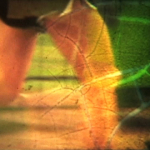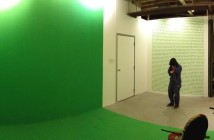We set out to structure our exploration of a field that had spread itself around us while we were busy making movies. To ground our investigation of the New Media field, we dutifully asked our search engines to link us to a text that could provide a starting point for what is sure to be a long expedition into the present circumstance: the world of New Media. This article documents the resulting conversation.
Jennifer Montgomery, Transitional Objects, 2000
TRT 19 minutes, 16mm & video
Distributed by Video Data Bank
Tara Nelson We are going to discuss the Lev Manovich text, "New Media from Borges to HTML: Introduction for the New Media Reader". . . . [PDF]
Jennifer Montgomery I think we decided the least we could do if we were going to discuss New Media was to read the well-known and important text.
TN You selected the text, and I think it’s a good choice.
JM This was written in 2003. Given one of the things Manovich discusses is speed, it’s already outdated. He makes some really radical statements, and I don’t know how many people have adopted them, as they’re really more provocations. But the most radical statement is made at the beginning: "these technologies themselves have become the greatest works of art today. The greatest hypertext text is the web itself because it is more complex, unpredictable, and dynamic than any novel that could have been written by a single human writer, even James Joyce." And then he goes on to say the greatest avant-garde film is software, including Final Cut Pro and After Effects. But the thing about the Internet is what struck me: ". . . computer scientists are the most important artists of our time, in fact maybe the only artists who will be remembered for this historical period."
TN Even though we don’t know who they are. . . .
JM Well we don’t, because we live in the ashbin of history. But seriously, how can anybody compete with the Internet as a paradigm shift? It’s a little like saying a whole culture emerged, a great civilization, it had its problems, they went to war sometimes, but what an amazing culture. And that’s what the Internet is. This isn’t just an expansion of our culture. It has a life of its own and has to be recognized as a multiplicity of creative forces, and the computer itself has its own discursive abilities, and it takes off after a certain point. It’s not just about preexisting algorithms that have been sped up, but algorithms that have been sped up to a point where they are entirely new.
TN I have a reference:
"It is time that we treat the people who have articulated fundamental ideas of human-computer interaction as the major modern artists. Not only they invented new ways to represent any data (and thus, by default, all data which has to do with "culture," i.e. the human experience in the world and the symbolic representations of this experience) but they have also radically redefined our interactions with all of old culture." [Manovich, p. 7]
But I don’t see modern art as symbolic representation.
JM Why don’t you? It’s one representation. But so is a homeless guy’s sign.
TN In a formal sense, modern art is nonrepresentational.
JM I think you’re taking the word representational too literally. Maybe a better word is "reflective" of human experience, or a "game-changer" of what is human experience is in these times. I think you’re tripping up on that idea of whether something is abstract or representational. No one will argue that the abstract expressionist movement was a direct representation of post-WW II lived experience, especially in the US. No one would argue that.
TN But I think he’s over-simplifying. Overall, I think it’s about structure, though he does get to form, and aesthetics.
JM What’s the difference between form and structure?
TN Well, in this case I think it’s about a growth. A massive branching structure, a rhizome.
JM A structure that has no intentionality?
TN I guess it can be seen as an object, or the object-outcome, which he is saying we are now beyond with New Media. Instead of creating new objects we’re assimilating old ones and dealing with the archive, trying to figure out new ways of connecting with what has already been created.
But today we are here to talk about ourselves, and our own work in relation to New Media. For myself, I had a real roller coaster ride with this article, which is the sign of a good argument. I came to discussing New Media from a defensive standpoint, because I feel that this new media omnipresence is a burden or a weight.
JM So would you like it all to just go away?
TN No, I’m not that naïve. But as an artist I am interested in direct confrontation with the reigning paradigm. My own choice of medium, Super-8 and 16mm film, is more subversive than it has ever been. Shooting film in the current digital climate is subversive. Creating a film-object rather than a digital file is subversive. Yet Manovich says the artifact is now obsolete, in any medium. We don’t need more artifacts created by a single maker. They’re all out there.
JM There’s a counter argument. The first proposition is that technology is now dictating terms and taking over preexisting terms. But the second argument is that there are media and forms of expression that are irreducible through the algorithm of technology, and in fact they continue to dictate terms over the algorithm.
One example is the movies: even though they have become increasingly interactive, it’s still the single channel narrative—that ideation of original individuals driven by human experience—that is massively popular. We still see human beings on the screen. Films continue to be driven by human beings, and consumed by human beings, based on what human beings represent. In terms of mass distribution, it’s not advisable to make movies into headless hydra of every viewer’s individuated experience.
There’s an algorithm at work and we don’t understand it. Then there’s this wonderful acknowledgement of the fact that so many innovations in cinema, verité, intimacy of digital cameras, rapidity, long-take—the immediacy—the language of cinema continues vestigially. There’s a kind of haunting, as we know. It’s not just that the words are not going away, it’s that the ideas are not going away. Manovich also says that at some point all of these technologies—TV, photography, cinema—were new media. But it doesn’t always equate. Not all things were new media.
Take early video. It started off as a revolutionary form, and then it split between artists and the idea of the studio and the gallery and grassroots video and documentary and what eventually sadly became PBS, and public access. But there was an idea that that new technology would allow for better democracy and give us better access to the real by offering "more immediacy and/or the possibility to represent what before could not be represented." And, ". . . eliminating the distance between the observer and the observed." These terms have survived and can be related to all the different things we see on the Internet: direct cinema, candid cinema, uncontrolled cinema, observational cinema, cinema verité. . . .
TN You don’t really believe that though, do you?
JM Yes I do.
TN It’s all mediated and constructed.
JM It’s not uncontrolled; it’s no more so than all cinema is uncontrolled. But there’s no such thing as truly uncontrolled cinema. I don’t believe that. I think the idea of a human being absented from behind the camera is as important to both film and video history as it is to new media.
TN How is a human being absented?
JM Surveillance, for example.
TN So you actually mean physically behind the camera. But they’re still being controlled.
JM This is just rolling off of his tongue. . . .
TN I know. I want to engage it personally.
JM You’re getting impatient and we have plenty of time. We have to establish these ideas and how we agree with and disagree. One of the things I think is important to acknowledge is the role that film technology and aesthetics plays behind the scenes when we ingest the myriad forms of new media.
TN Perspective is the word. Establishing that cinema had the opportunity to create new perspectives. The idea of angles, close-ups, the actual language. montage, time. . . .
JM I think Deleuze’s books on cinema [PDF] are important in relation to that. In the second book The Time-Image, his theory is that our sense of time was permanently fragmented by the trauma of WWII, and film had to contend with the fracturing of time. So it became about the breakdown of a unified vision in cinema. And he gets into this idea of a multiplicity of viewpoints, which is related to the loss of a central self in authorship. All of these ideas are related to new media; therefore, we slither into new media without too much trouble. The hardest thing for you, me, and to a lot of other people is the loss of mastery. So we try to hold on, and revisit.
TN It’s not about holding on. It’s about recognizing an old form as potentially new media.
JM I apologize, you’re right. Saying hold on is absolutely wrong, I don’t mean holding on. Though some people are, and they have a good reason to hold on: that’s what they built their careers around. And they’re sticking by their guns. But because Super-8 has been rendered so obsolete, I don’t think right now you could in any way implement Super-8 and say that you are holding on. It’s too long gone. If you are doing anything with it that is of remote interest, you are engaging in a kind of subversion. My viewpoint is that it’s related to the eternal human contrarianism and resistance, in that we will only allow things to speed up to a certain point, after which we will put our collective feet down and say, "We need to slow down."
TN You believe this is something that will happen, or always happens?
JM It IS happening. In relation to new technology and to new media. I agree with Manovich, that technology is the greatest creative force of all. But technologies speeds things up to a point of where a de-centering occurs, and many people will want to subvert that velocity, the icy surface of speed, by using a technology whether it is obsolete or new to challenge a host a assumptions, at the same time as acknowledging them. And thereby slow down the process of consumption. Production and consumption.
TN It’s interesting that you talk about speeding up, because in his opening argument Manovich states that the Unites States "assimilates new technologies too quickly, makes them invisible overnight without thought to how the technologies affect our lives or our culture." The implication is that the US assimilates without reflection, whereas Europe takes time to observe, doesn’t assimilate as quickly, and yet makes these little thruways available in more of a controlled, experimental phase. He talks about the "art mafia" in Europe being impenetrable by young artists. So Europe, specifically Eastern Europe would allow these central locations where people could access Internet technologies, that weren’t accessible within the household, specifically for purposes of art incubation.
I agree that culturally the US adopts anything consumable as soon as it hits the market and that causes a lack of reflection. So I don’t know if your idea that "we put our feet down" is happening. You and I are sitting on opposite sides of the table, and I’m probably the one who’s putting her foot down. I can specifically talk about iPhones. Don’t take this personally, but I really think iPhones make people less interesting. iPhone users depend on this device as the ultimate authority. They don’t navigate themselves; they don’t know how to get from A to B. If an idea that’s interesting comes up, they immediately feed it into the iPhone so Wikipedia can validate it via the rhizome, the Internet. It’s so ironic to me because I actually see that this is fascism, that this small group of software developers has taken over our economy, and we’re controlled by a single corporation.
JM Two things: Who would disagree that we’re no longer present in the way we used to be, that we’re not using our amygdales in the way we used to? I wouldn’t go as far as to say it’s fascism. The US has lead the pack of lemmings in the mindless ingestion of new technology, and no one’s gonna argue with that either. But no matter how many times you say that our brains have been hijacked or instrumentalized by multi-national corporations, there is enormous possibility and danger and risk associated with the "counter-hijacking" of those technologies. As a result of which, the director of the CIA announced last week that the greatest danger to Homeland Security is cyber terrorism. I mean, they’re not talking about any of these corporations. They’re talking about hackers.
TN Because we are now so reliant on a single source that should that source be infiltrated we’re fucked.
JM That’s true, we’re . . . vulnerable. We’ve been rendered vulnerable and soft. The other day I was trying to get home, and my iPhone died. And I got lost. I don’t know my way home without my Google map and my GPS. I started weeping.
TN So you became human for a moment.
JM Yeah, me weeping is so unusual. Anyway, I wanted to say that while there are billions of people who are vulnerable because of the consolidation of power, because of the proprietary use of code, there are also a multitude of people who can learn it. If the Internet is the greatest text ever written, anybody can read it.
TN Hmmm.
JM If all those algorithms are the great creative act, anybody can learn them.
TN Doesn’t mean it isn’t controlled by the few.
JM It’s controlled, but unlike nuclear technology, when you have it in the hands of a dangerous few, really you have any number of people who could learn computer technology and hack into any number of systems and take us down. There is nowhere near that number of people who know enough about nuclear physics. And the risk is based on the non-materiality of cyber technology.
TN Is this a quantity versus quality thing?
JM Yes, we’re at risk, we’re dependent, there are ways in which we are not using our brains. I agree, but that doesn’t mean that the monopoly cannot be taken down, because the monopoly is built on code, and code can be learned by almost anybody. With respect to this idea of people collectively saying, "No, I will not give in to the passive consumption of this technology or the rapidity with which I consume it," that is relevant to your practice as an artist working in S-8. I think that at a certain point people do have a need to slow things down because if they don’t, their brains fuse. Even though our brains are developing. Our students’ brains can process at a faster rate than we ever could. But there are evolutionary limits. To say you’re going to work in S-8, and you’re going to present in the original format, and you’re going to allow us to hear the sound of the apparatus, that you’re going to make it an interactive experience, and that you’re going to take the risk that your media will look like shit by subjecting it to the vagaries of these languishing labs, or subject it to even more vagaries by hand processing . . . it’s like the slow food movement!
TN What?
JM People are perverse!
TN Okay, there it is. Slowing things down is interesting because I feel that the speeding up of these conveniences has precipitated a slowing down by pulling the wool over our eyes.
JM I think it’s really important that you make a distinction between the temporal definition of slowing things down and the other definition, which is essentially retardation. In which you don’t have to think. What I’m talking about is actually wanting to slow down the time between the thought, the action, and the result.
TN I don’t really see how that’s not retardation.
JM That’s retardation in the musical sense of the word. You’re talking about the fact that people think they can do anything because they don’t have to think.
TN It’s an illusion of slowing things down. I’m sticking to the pulling the wool over the eyes. New media so often takes the form of technological conveniences.
JM It’s ALSO really important that you not say that new media does that. New media is a critical movement in response to new technology.
TN Let’s read Manovich’s definition: ". . . parallel tendencies in modern art and technology after WWII." [Manovich, page 5]
JM But then he goes on to say there’s a difference between new media and new technology.
TN So you’re saying I can't use new media and new technology interchangeably.
JM Here: "To begin with, we may distinguish between new media and cyber culture. In my view they represent two distinct fields of research. I would define cyber culture as the study of various social phenomena associated with Internet and other new forms of network communication. Emphasis is on the social phenomena; cyber culture does not directly deal with new cultural objects enabled by network communication technologies. The study of these objects is the domain of new media." [Manovich, page 8] So if you’re talking about something that’s not being actively deconstructed, studied, or having work made about it, then he would ask that you refer to it as cyber culture, cuz it’s just culture, and new media is the study of that.
TN . . . the study of the object.
JM The objects. The things, if you want to call the Internet a thing, which I think it is.
TN Well, the iPhone.
JM I made a whole piece about the dematerialization of the cinematic object, and mourning the loss of that object. [Transitional Objects, 2000, above] And we all have talked until the cows came home—to the extent that cows are still objects. . . .
TN . . . and that there is home . . .
JM . . . and to the extent that there is such a location—about the death of analog. But back in the day, in the late 1990s—I was slow on the uptake—I made the transition to editing digitally and experienced a complete loss of mastery. I found myself studying object relations, especially mastery in relation to children, because I felt like a child. I felt like a child whose objects had been taken away. So I talked about dematerialization of the splice. But the fact is that they (films/videos) continue to be objects, and the production of objects has never been so great.
TN What is an object?
JM Right, exactly! When we were transitioning—and many of us were being forced to transition—from analog production to digital, we were experiencing that transition as a loss of the object. Ironically, one of the reasons I went into film was because I didn’t want to make object art. I was a painter, and I was tired of lugging my giant paintings around. And I didn’t think that a white cube with big objects in it was my idea of a life. But then it turned out that film was a bunch of MAJOR objects. The REAL non-object, back in the day, was video. So then it was the materiality of film versus the non-materiality of video. The electronic signals that made up video. And then it was even more true when it became ones and zeros on the Internet. Or ones and zeros anywhere. By then we had this increasing individual possession of objects, which enabled us to be connected to these clearinghouses of information.
TN The object being the computer, the PC.
JM Really, the start of this all is the invention of the PC.
TN These are the new media objects.
JM As it turns out, while I was busy grieving the death of the object, I was doing so on objects. One thing I have always thought about is the arc of cultures: there are studies about what happens to cultures in their late stages. What is decadence? Well, in the arc of decadence, things become smaller and smaller, there becomes a fetishization of the small. This hearkens back to what it meant in western culture when it became fashionable to be thin. The wealthy ate less because the smaller, thinner, more delicate became a fetishized aesthetic. So I wrote this stupid piece on baby vegetables called "baby vegetables: fashion or fascism, kitsch in the kitchen." It was about how the marker of prosperity earlier in a culture’s development was to have a lot. Conspicuous consumption: to show that you weren’t starving, you beefed up. Women, especially. Then you hit the teens and twenties, and thin is beautiful.
Anyhow, now we have all these things, and they get small and smaller, because of the PC. Any technology starts big and gets smaller and smaller. Cameras have gotten small beyond our comprehension. But it goes along with other trajectories in the development of technology and first world cultures, and the transition of third world to first world cultures. The idea of waste. And consumer fetishism. Increasingly convenient, small, portable, and these objects are our friends.
TN Smallness is related to cultural constructs. For me, I have a pretty centralized, dogmatic view of it, which is about capitalist consumer control, and that we are being controlled by our tendency to desire objects and want more of them. Because our physical space is getting smaller, yet we want to continue to consume things.
JM We have virtual space.
TN Oh yeah. Look at all the photos, they just pile up.
JM All right, you’re saying that you’re a purist.
TN I am a purist. To me it’s a form of clarity and drawing a line in the sand and saying "I know I am here. At least I know I am here." But so do all the consumers who need their iPhones, and don’t want their objects taken away. I’m as threatened as anybody else. The purist stance was something I came to, I wasn’t born that way. Purism gives me the right to make blanket statements that help me navigate toward the next thing.
JM I believe [Donald] Winnicott’s theories, no matter what. No matter what, children still have to learn object relations. Geometry, and where things are coming from, even non-objects, like sound. Spatial relations: Infants can’t tell where a sound is coming from until they learn to place it in space, hence in relation to objects.
But what I’m saying is I’m now retracting this passionate anthem to the lost object, which I and many others sang back in the day. Of course it was fear-based. And I think we have more reason to be afraid today than we ever did. The object on which we live is so endangered.
TN There’s nothing wrong with mourning the loss of something.
JM I’m just saying I don’t agree with the premise of that grief any more.
TN Because you mourned it and let it go.
JM No, I don’t agree that what I was mourning was the loss of an object. Because I didn’t lose film, at least not so tragically and completely as we would like to believe. What I was mourning was the loss of mastery, and the sense of control.
TN And that’s what you’re saying is the actual issue.
JM I do think retardation and the way we’re being instrumentalized is crucial to everything we’re talking about. In regard to your work and being subversive, it has a kind of optimism to it: "Can we not stop and enjoy the way in which things happen when they are done analog, because they happen more slowly, and they never happen the same each time."
TN So that has to do with the "Media" in new media. But I still have an overriding question about the concept of what is considered "new." What about when we use older technology in a different time, in the present? Can’t something that was made forty years ago still be conceptually "new"? I take issue overall with "newness" for these reasons, even though I understand in the case of this article we are discussing computer-based technology, but even that isn’t really ‘new’ anymore.
JM But this is about the history of invention.
TN Someone who I feel is glaringly absent from this article is [artist and filmmaker]Stan Vanderbeek. He was interested in integrating technology into the conceptual development of his images. For example, he turned the telephone into an image-creation device using an early form of what became the facsimile. You could send a signal through the telephone that would be read at the other end by a printing device that would then create an image. He was employed—as an inventor—by NASA and Bell Labs to investigate technology that could be used for image creation and communication simultaneously. Vanderbeek was working with the telephone in the 1970s, so the telephone was not a new technology. But he was creating a new use for it.
JM Let’s make an analogy between a technology and a civilization—the technology of the telephone or film, for example. First it gets used in ways that are referential to the way things were before that technology existed, so it is designed to be almost a mimicry of something that pre-dated its invention. Photography, for example, was originally referencing painting. Film mimicked the theater and its proscenium. So, a technology exists for a while and eventually it gets freed up. People begin to think about new uses for the existing technology, maybe even uses that are against the original intended purpose. The avant-garde is predicated on this subversion: the essence ofdétournement is to take an intended meaning and re-direct it. But that can’t happen until something has been around for a while and it becomes part of the vocabulary. Once the frame of reference is firmly ensconced, people can start to play, what Winnicott calls "serious play." There is a great book by Christopher Bollas called In the Shadow of the Object, about applying Winnicott's theories about object relations and transitional phenomena to adult art practices. All of these ideas come from child psychology, and relate to art production.
But there is a mystification and instrumentalization that has occurred, in which people believe they have mastery when they are actually being driven by a product. This relates to your argument about dependency—we operate under the illusion of being increasingly in control through these devices but in fact we are increasingly controlled by them.
It’s interesting because . . . it is hard to learn film. I don’t know if it is any easier or more difficult to learn film than it is to learn to write code. But because of where film is going—because it is becoming rarified—it is becoming a more complicated form of pleasure. We are in essence saying, "lets set aside our contemporary technology long enough not just to reconsider the older technology, but to inhabit it within the context of where we are now, as an act of revolt, to push back against the hegemony." This is not about whether or not shooting film is subversive. Yet activism too has shifted its focus increasingly to tactical moments, small actions, things happening locally, which branch outward. To include a network of individuals using technology against its intended purpose. It was certainly not intended that the revolutions in Egypt and elsewhere would be facilitated by Facebook.
There is the term "deskilling," which gets thrown around a lot now. It makes no sense to apply it to the use of an outmoded or rarified technology, because it takes skill to use those technologies properly. But deskilling, while it originates from the elimination of skill sets in the labor force, is a popular idea in the art world, used as a point of resistance and political critique. Toward that end, a lot of people who are working in New Media who are interested in how to mess things up, and I believe that interest is akin to the interest in the subversive use of outmoded technologies.
TN The potential impact upon a larger audience due to the reach of media is certainly new, but the concept of messing things up using media is not new.
JM Newness is happening at an accelerated rate. The idea of what constitutes personhood is shifting.
I continue to be both resistant to, and receive pleasure from, certain works of new media art. The saying "I know it when I see" still pertains. There is good art and there is bad art. But we are not in a position to make an informed critique of the New Media community.
I am loath to continue referencing this article. It is an introduction to a book we haven’t read. You could say that because of the nature of the beast anyone is empowered to speak about New Media. And anyone, by contrast, is empowered to criticize it. New Media has a lot in common with cinema: it is a consumer culture, a "low" art form that can only be elevated through the rarification of knowledge and artworld practices. But that can make for a lot of bad art. People just get caught up in asking, "How did you do that?"
TN Manovich says the makers of Final Cut Pro are the greatest filmmakers of our time. That’s a stab.
JM I loved that.
TN I know you did. But to me it goes back to the quantity versus quality argument. I think he’s saying that the ultimate goal of the avant-garde artists of the 1920s was to create works of art that could contain multiple conceptual meanings at once, and now that has been achieved (through Final Cut Pro). But the software does not always produce good art. Just because we can doesn’t mean that we do.
JM The whole thing has been inverted. For a long time the wild card was technology. And with technology come accidents. There is a kind of inversion now, wherein I would say the wild card is people. Individuals, or groups of individuals, and the critical mass that occurs in their points of resistance to—and their skill sets with—new technology can turn it on its head. And it won’t go away. You can hide your head in the sand and continue to make collage films or use an optical printer and keep hand processing. . . .
TN I agree with you. I think what is missing from this article, and from this discussion, is the human element.
JM This article was written in 2003, and everything has changed. The most appropriate technology to approach societal issues and even issues that are bubbling beneath the surface of our consciousness is, I believe, mass media. And mass media is now intrinsically woven into cyber culture. I have always been opposed to copyright. I believe that our works are not going to be seen enough, and I want them to be seen as much as possible, even if it means loss of income. But what are the chances of income anyhow? So why not put it up there? The weirdest shit has happened with my work by virtue of the Internet. People have pirated my work and mashed it with other things. A friend of mine sent me a link to an eBay item that was a VHS video that took some scenes from my film, Art for the Teachers of Children, and cross-cut it with David Hamilton’s soft core porn, and other things.
TN That’s weird.
JM I think it was one of the highest compliments my work could ever be paid.
TN My favorite part is that it was on eBay. It wasn’t being displayed; it was up for auction.
JM I, too, am a scavenger and I pirate other peoples’ work all the time. Piracy proliferates when things go viral. The original object’s value gets nullified, but its cultural cache escalates because enough people know about it, and I like the idea of the infinite number of people who could know about something. I like being part of that sort of uncontrollability.
TN Manovich writes about New Media as a necessary outgrowth of post modernism—a phase in which we culturally and artistically were left to deal with existing works of art, to work within contexts rather than with objects. The burden is to deal with the archive of media-based information, to store it, re-use it, and make it accessible again. We have a glut of media that has been proliferated for decades. All the artifacts of culture are there, we have recognized them as objects, and now we have to figure out where to put and how to re-assimilate all of it. New Media is the antithesis of the object in many ways, and gives us "a place to put it all," so to speak. But whether or not that is a beautiful thing. . . .
JM Have we used the word beautiful even once?
TN No, but we are talking about art, and the ability of art to reflect the human experience. I think New Media is accurate in reflecting the time we are in, but I don’t feel artistically compelled by it.
JM Technology to me is like a clock, and it is telling me that time is passing and I am getting older. I think there is a kind of freedom in being outmoded. For a long time I considered myself on the cutting edge, and as a teacher I had to prove my use-value over and over again with increasing stridency. I had to stop. It doesn’t mean I will stop making the work, or teaching, but I am have stopped pretending that my concerns are the most urgent, the most contemporaneous, the most current.
TN I can relate to that.
Tara Nelson, Flying Fish, 2012
•••
Editor's Note
In answer to our request for some exemplary New Media artists and artworks, Jennifer Montgomery and Tara Nelson sent us the following projects:
JENNIFER
One of the coolest projects I have encountered—incidentally created collaboratively by a local Boston artist, John Craig Freeman, who teaches at Emerson.
www.mappingararat.com
And Daniel Sauter
TARA
Kelly Dobson, Blendie
web.media.mit.edu/~monster/blendie/
Eric Fleischauer
www.ericfleischauer.com
Jacob Ciocci/Paper Rad
www.paperrad.org
- Tara Nelson Babystorm, 2013 Digital video
- Jennifer Montgomery Art For Teachers of Children, 1995 83 min, 16mm, b/w, sound
- Jennifer Montgomery One Species Removed, 2012 HD video, 38 min
- ra Nelson Marathon, 2010 Super-8, color, silent, hand painted film
- Tara Nelson Hull, 2011 16mm, color, optical sound
Lev Manovich, "New Media from Borges to HTML", Introduction to The New Media Reader, edited by Noah Wardrip-Fruin and Nick Montfort.
Cambridge, MA: The MIT Press, 2003, 13-25.
(From author’s site: www.manovich.net)













